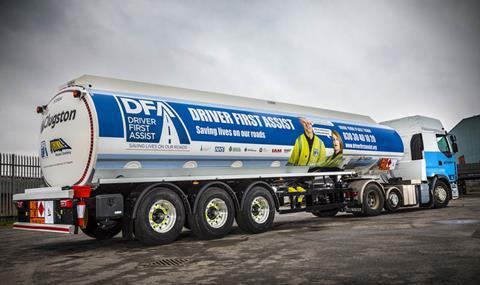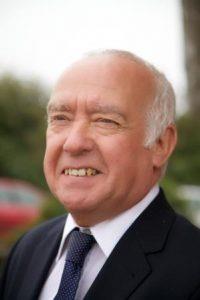
Driver First Assist (DFA) was recognised at a parliamentary reception last week (18 January) and has received warm words and £70,000 of funding from the DfT. Motor Transport technical editor Colin Barnett takes a look back at the development of the first aider scheme.
I first met David Higginbottom back in 2012, when he visited Road Transport Media's office to invite us to help provide publicity for an exciting new project that he was working on.
The plan was to train some of the great number of professional drivers on Britain's roads in what to do in the not unlikely event of them being among the first on scene at a road traffic accident.
The background was data that showed 46% of traffic accident deaths could be prevented by first aid administered before the emergency services arrive. While the target time for an ambulance's arrival is eight minutes, it only takes four minutes to die from a blocked airway.
After explaining his vision, he left us convinced by the idea in principle. However, with some knowledge of how jealously the emergency services guard their well-defined roles, we were rather sceptical about them accepting a "fourth emergency service".

However, Higginbottom obviously gained some influential allies, including the now retired PC Steve Rounds, the "good cop" from TV's Motorway Cops series, and Malcolm Price from the West Midlands Ambulance Service.
First day
In 2013, I found myself at Hilton Park services on the M6 participating in the first training day organised by what had become established as Driver First Assist, and became member number two.
The training took the form of a fully approved seven hour Driver CPC module, although it's equally valid as a stand-alone course. The syllabus, approved and, indeed, delivered by ambulance and police personnel, is in two distinct parts. One comprises basic life-supporting first aid, with particular emphasis on the type of injuries to be expected in traffic collisions, together with resuscitation techniques.
The other part covers accident reporting procedures and management of an accident scene until the arrival of the professional emergency services. This section includes basic fend-off techniques where, positioned appropriately, the DFA member's vehicle can be used to protect casualties from further harm.
One of the two most important lessons taught are the golden rule of any accident responder, assess the risks and protect yourself before helping others. The other is simple, how to identify your location, especially using the marker signs on motorways, so that the emergency services don't waste time looking for the accident scene. It was also explained why it's better to use the roadside emergency phones rather than a mobile, whenever possible.
The training is pitched at a realistic level, not at providing replacement police traffic officers or paramedics, but to stabilise a situation and help ensure the right professionals arrive quickly at the right place with the right knowledge of what they can expect to find.
In the subsequent years since I attended that first course, DFA has established a national programme delivering the training to a wide audience. So far, 100 courses have been run and 1,000 members have received training. Given that most truck drivers have to complete Driver CPC, there are few courses that provide such great potential benefit to society.
Some potential trainees, with perceptions of US-style litigation, are afraid of being sued if their well-intentioned actions end badly, but the point is well made that no-one has ever been sued for trying to help.
In fact, in some European countries, it is an offence not to help. The DFA scheme has been endorsed at the highest level by politicians and transport bodies, including the traffic commissioners and organisations represent chief ambulance, police and fire officers.
Clugston Distribution has put a Driver First Assist liveried tanker (pictured main) on the road in support of the charity.














